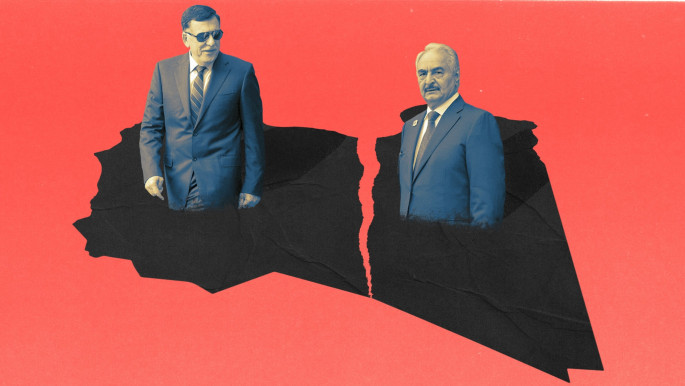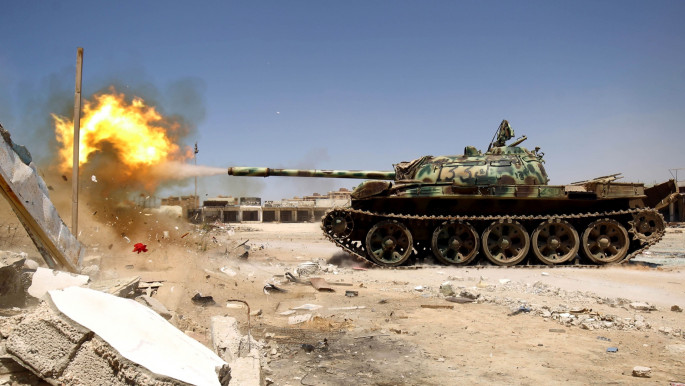France and Turkey's growing rivalry in the Middle East
Yet France is adding to this regional polarisation, as it also sees Turkey's foreign policy stance as a threat to its own economic and geopolitical interests.
Such brewing tensions may also drive a deeper wedge between Europe and Turkey. Though Turkey and France have traditionally enjoyed strong relations, Paris has perceived ideological differences with Ankara.
Former French President Valery Giscard d'Estaing, and then president of the Convention on The Future of Europe, said in 2002 that "Turkey is not a European country", adding it is part of "another culture, another way of life" and that its successful bid to join the European Union would mark "the end of Europe".
When Emmanuel Macron assumed power in 2017, he called for better relations between Turkey and the EU, yet their ideological and geopolitical differences have ultimately triggered colder relations. The following year, Macron declared there was "no chance" of Turkey ever joining the EU.
 |
Brewing tensions may drive a deeper wedge between Europe and Turkey |  |
Tellingly, in January a Turkish couple living in France were denied French citizenship. Murat Büyük, who lived in France for 43 years, slammed the French authorities' decision against herself and her husband Şerife, reportedly due to her support for President Recep Tayyip Erdogan.
Clashes over Libya
France and Turkey's past tensions have now fully erupted, largely due to their different objectives in Libya. Though Libya has never been under Paris' sphere of influence, compared to former French colonies in West Africa and the Maghreb, France has covertly backed warlord Khalifa Haftar's campaign to capture the capital Tripoli, alongside the UAE, Egypt, Russia and Saudi Arabia.
Paris perceives Haftar as a stable force to guarantee Paris' economic and security interests in Libya, particularly to secure its energy interests through its Total oil company.
Turkey in January blamed France for creating instability in Libya ever since 2011 – through its intervention against former leader Muammar Gaddafi and now through backing Haftar - while Macron slammed Ankara for not "keeping its word" that it would not intervene in Libya.
 |
|
| Read more: Is Libya on the road to de facto partition? |
These fledging differences evolved and continued into March as France's navy seized a Turkish ship delivering military equipment to the Government of National Accord (GNA) along the Mediterranean Sea.
Meanwhile the French Embassy in Athens condemned Turkey's operations while claiming last November's deal between Turkey and the GNA was 'invalid'.
Paris feels threatened by Turkey's intervention in Tripoli, which aims to bolster the internationally recognised GNA, after signing a Memorandum of Understanding last November which also granted Ankara permission to explore Tripoli's shores for oil.
Turkish military support to the GNA has also helped contain Haftar's offensive and is now seen as 'turning the tide' in Libya's war, including after the significant recapturing of the strategic al-Watiya airbase near the capital last week.
On 14 May, North Atlantic Treaty Organisation (NATO) chief Jens Stoltenberg said that NATO – of which France and Turkey are both members - was ready to support the GNA. Yet Paris has largely defied and undermined NATO's stance through supporting Haftar, whilst still overtly supporting the GNA.
France has blocked European peace measures for Libya, vetoing an EU call in April 2019 to stop Haftar's offensive on Tripoli. This divergence therefore hinders Turkey and Europe's cooperation on key regional issues, while putting the two at greater odds.
Evolving tensions over Syria?
While facing setbacks in Libya, France directed some of its attention towards the majority-Kurdish region of northern Syria. A French delegation held talks with the Kurdish National Alliance (HNKS), which is close to the Democratic Union Party (PYD), throughout May. France evidently seeks to bolster its influence in northern Syria, potentially even as a retaliatory measure against Ankara.
 |
France and Turkey's past tensions have now fully erupted, largely due to their different objectives in Libya |  |
Northern Syria has long been a sensitive area for Turkey, given its opposition to Kurdish factions like the Syrian Democratic Forces (SDF) and People's Protection Units (YPG) which is aligned to the Kurdistan Workers' Party (PKK) that has carried out attacks on Turkish soil.
Emmanuel Macron previously criticised Turkey's 'Operation Peace Spring' against the YPG. Furthermore, France in 2018 supported the Syrian Democratic Forces in northern Syria to contain the Islamic State (IS). Previously Macron offered to mediate between Turkey and the YPG, yet Ankara dismissed this. Turkey then criticised France for "supporting terrorists", accusing Macron of being "brain dead" and "needing a wakeup call" as they didn't cooperate on such regional issues.
France may have additional motives for engaging with these northern Syrian factions, to compensate for its loss of influence after previously supporting opposition factions against Bashar al-Assad. Furthermore, France may also be seeking to contain French nationals who fought for IS, and now sit in detention camps there.
Yet given Ankara's profound opposition to these factions, France's actions will create a further rift between the two should it continue its involvement there.
 |
|
| Read more: Foreign mercenaries and fractured healthcare heighten Libya's coronavirus risks |
Colder Turkey-EU relations?
France has also tapped into the concerns of other EU member states. Greece also has disagreements with Turkey over mineral rights in the Aegean Sea and Ankara's drilling of oil and natural gas near Cyprus. France declared in February that it "intends to stand by Greece" amid these tensions.
On 2 January, Greece, Cyprus and Israel agreed on a deal to construct a 1,900km pipeline through the Eastern Mediterranean sea towards Italy, standing in stark contrast to Ankara's plans for Libya.
Now, driven by a desire to consolidate their own access to natural resources, France, Greece and Cyprus on 12 May denounced what they called "ongoing Turkish illegal activities" in response to Turkey's drilling near Cyprus. Along with the UAE and Egypt, they "strongly condemned Turkey's military interference in Libya, and urged Turkey to fully respect the UN arms embargo," despite Paris and Abu Dhabi's own support to Haftar which violates Libya's peace process.
Meanwhile Erdogan called this "an alliance of evil" and accused France of being a patron of this anti-Turkey bloc. As France has seemingly cultivated these relationships to isolate Turkey, this would further sour Turkey and EU relations. France's own influencing of EU policy towards Libya will hasten this trend, adding to other concerns such as Europe's apparently insufficient aid to Turkey in dealing with the Syrian refugee crisis.
Now, with the United Kingdom moving towards Brexit, Turkey would be without a consistent ally within the EU, and given the bloc's generally cold political mood towards Turkey, a solid rapprochement will become more difficult. Should Europe remain divided and impotent over Libya, it would restrict hopes for salvaging these wider regional tensions.
Jonathan Fenton-Harvey is a freelance journalist.
Follow him on Twitter: @jfentonharvey



